Who Owns Walmart: The Largest Shareholders Overview
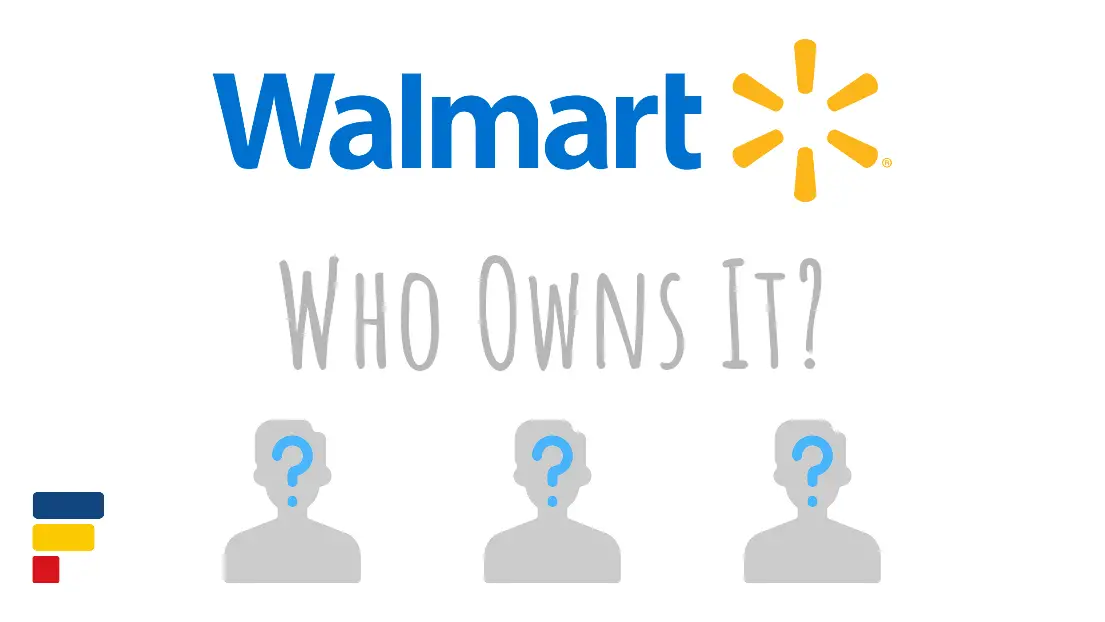
Walmart Inc. (WMT) is the largest retailer in the world. It is active internationally, but its revenues and profits come mainly from its US operations. Let’s look at who owns Walmart and who controls it.
Walmart’s largest shareholders are mainly members of the Walton family, who control Walmart mainly through their stake in Walton Enterprises, a family holding company. Together, the Walton family owns 47.9% of Walmart and effectively controls it.
|
|
|||
| Shareholder | Ownership | Voting Power | |
|---|---|---|---|
| Walton Enterprises | 37.2% | 37.2% | |
| Walton Family Holdings Trust | 9.9% | 9.9% | |
| Jim Walton | 0.4% | 0.4% | |
| Alice Walton | 0.3% | 0.3% | |
| Rob Walton | 0.1% | 0.1% | |
| Other | 52.1% | 52.1% | |
| Listed are shareholders holding >5% of any share class or notable in other ways | |||
 Source: Multiple SEC filings Source: Multiple SEC filings |
|||
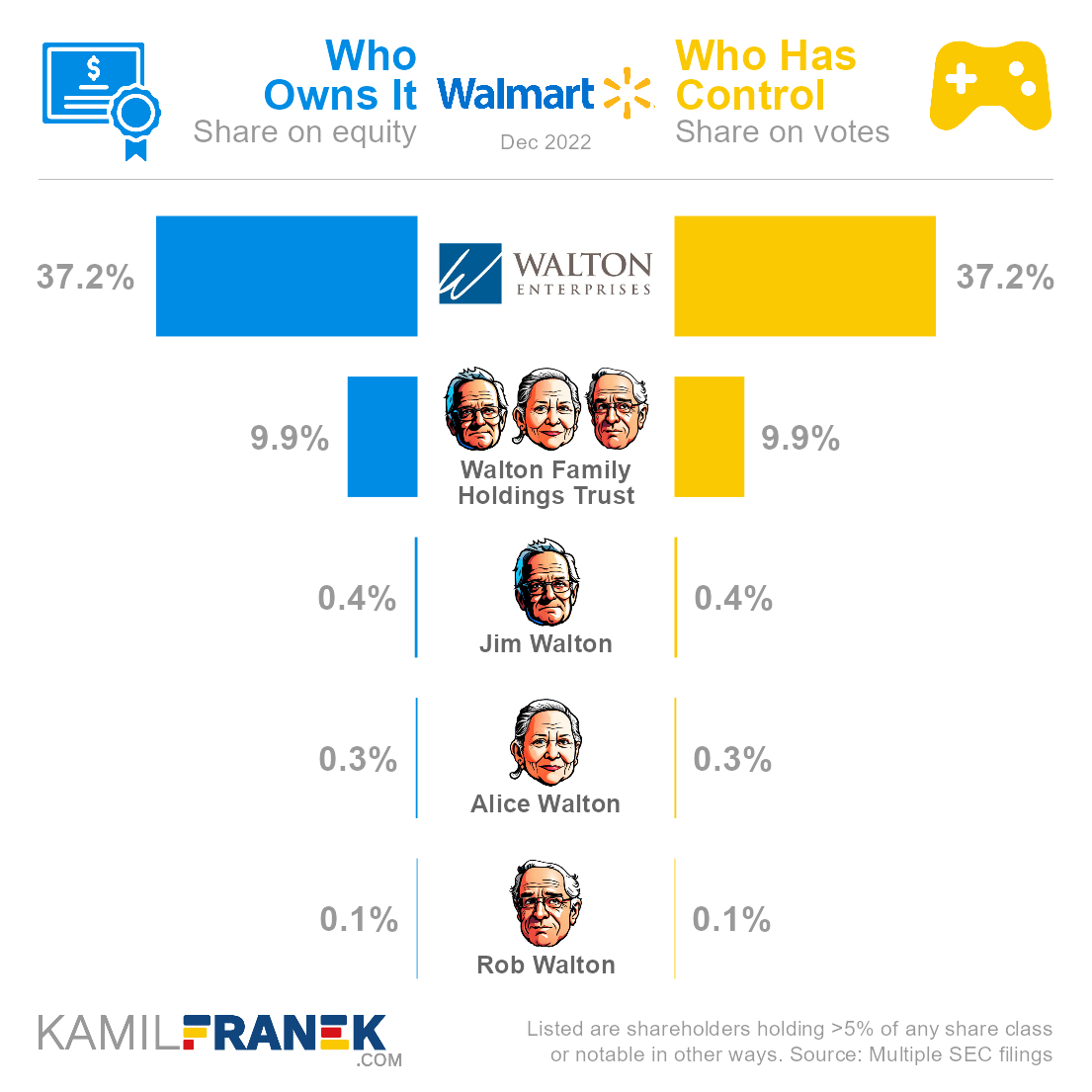
In this article, I will dive more into who owns Walmart and who controls it. I will show you who Walmart’s largest shareholders are, how many shares and votes they have, and how much their stake is worth.
If you are interested, you can also explore who owns other companies like Amazon, Nike, Volkswagen, and other articles in my “who owns who” series.
📃 Who Owns Walmart?
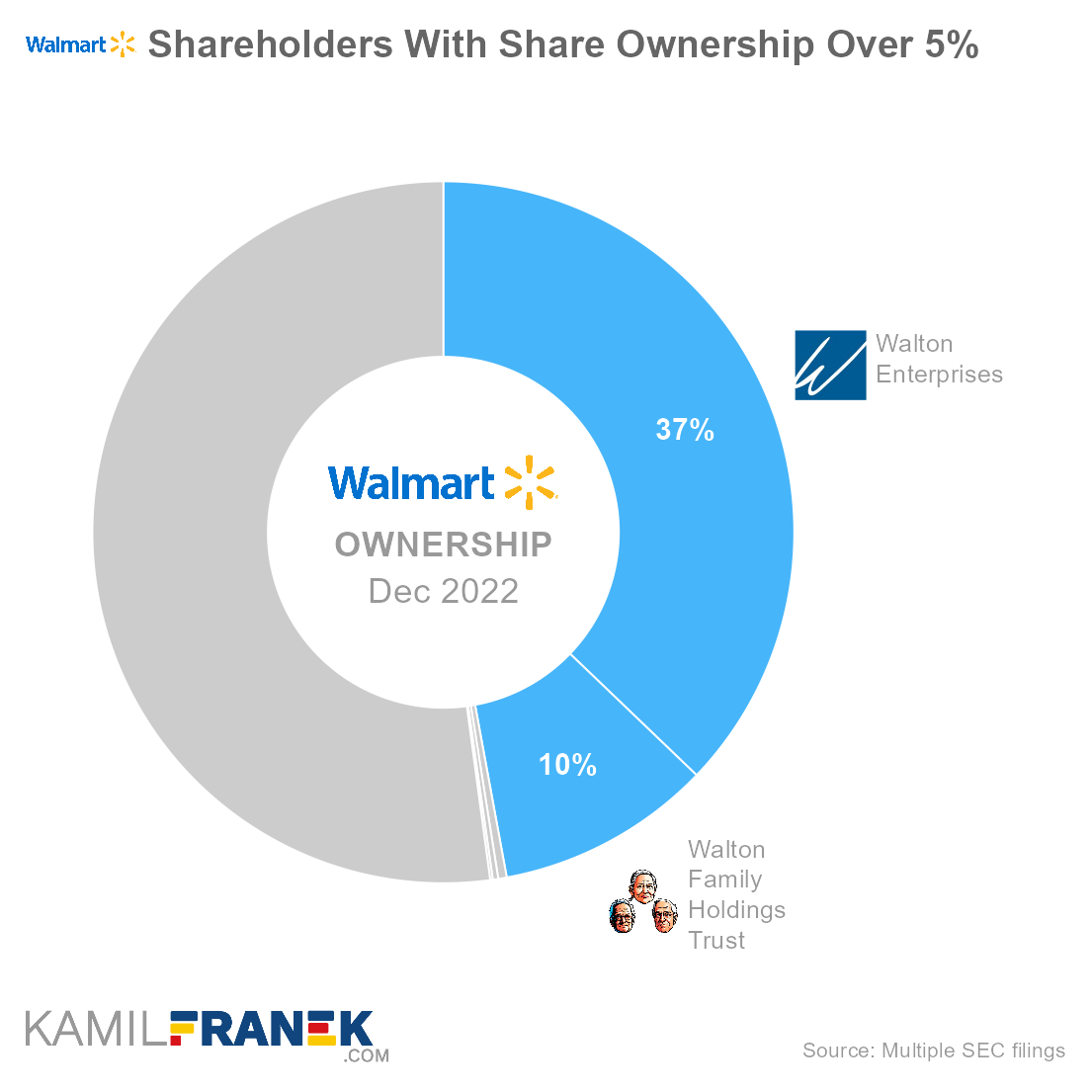
Walmart is owned mainly by the Walton family, descendants of the company founder Sam Walton. The Walton family owns 47.9% of the company, mainly through Walton Enterprises, the family holding company. Other “extended family” members might have additional smaller stakes.
- The Walmart family is represented mainly by Rob, John, and Alice Walton, children of Walmart’s found Sam Walton. All three hold small ownership in Walmart directly.
- The majority of the Walton family Walmart stake is held through the family holding company Walton Enterprises LLC, which owns 37.2% of Walmart. Rob, John, and Alice Walton are managing members of this holding company.
- Walton Enterprises LLC is a family-holding company that holds a stake in Walmart and other family investments. The company itself is encapsulated within T. Walton Estate Trust.
- Walton family holds a sizable stake in Walmart also through Walton Family Holdings Trust (9.9%), where Rob, John, and Alice are co-trustees. Rob, John, and Alice Waltonown a small amount of share directly.
- Walton family does not include only Rob, John, and Alice Walton. Their brother John died in 2005, and part of his 20% stake in Walmart Enterprises went to charity, and part went to his son Lukas Walton and wife Christy.
Walton’s family stake mentioned above does not include stakes “probably” owned by descendants of Bud Walton, brother and business partner of Sam Welton.
- Bud Walton died in 1995, and his shares in Walmart were inherited by his daughters, Ann Walton Kroenke and Nancy Walton Laurie.
- It is not confirmed if they still hold some stake in Walmart. If they do, it is a small stake in low single percentages.
The Waltons family is a dominant shareholder in Walmart, and currently, no other company owns over 5%, not even asset managers Vanguard and BlackRock.
Warren Buffett’s Berkshire Hathaway was a significant shareholder in Walmart for some time but sold most of its stake in 2016.
Walmart was founded in 1962 by Sam Walton and has been a publicly listed company since its initial public offering on NYSE in 1970 (Ticker: WMT).
- Before founding Walmart in 1962, Walton had already operated several retail stores in different locations.
- After co-founding Walmart with his brother Bud, the company grew rapidly, becoming the largest retailer in the
- Later, Sam reorganized his ownership of Walmart through the family-holding company Walton Enterprises LLC, where all his four children held 20%, and he and his wife had a 10% stake each.
Walmart Inc. is incorporated in the State of Delaware (US), and its headquarters are in Bentonville, Arkansas (US).
🎮 Who Controls Walmart (WMT)?
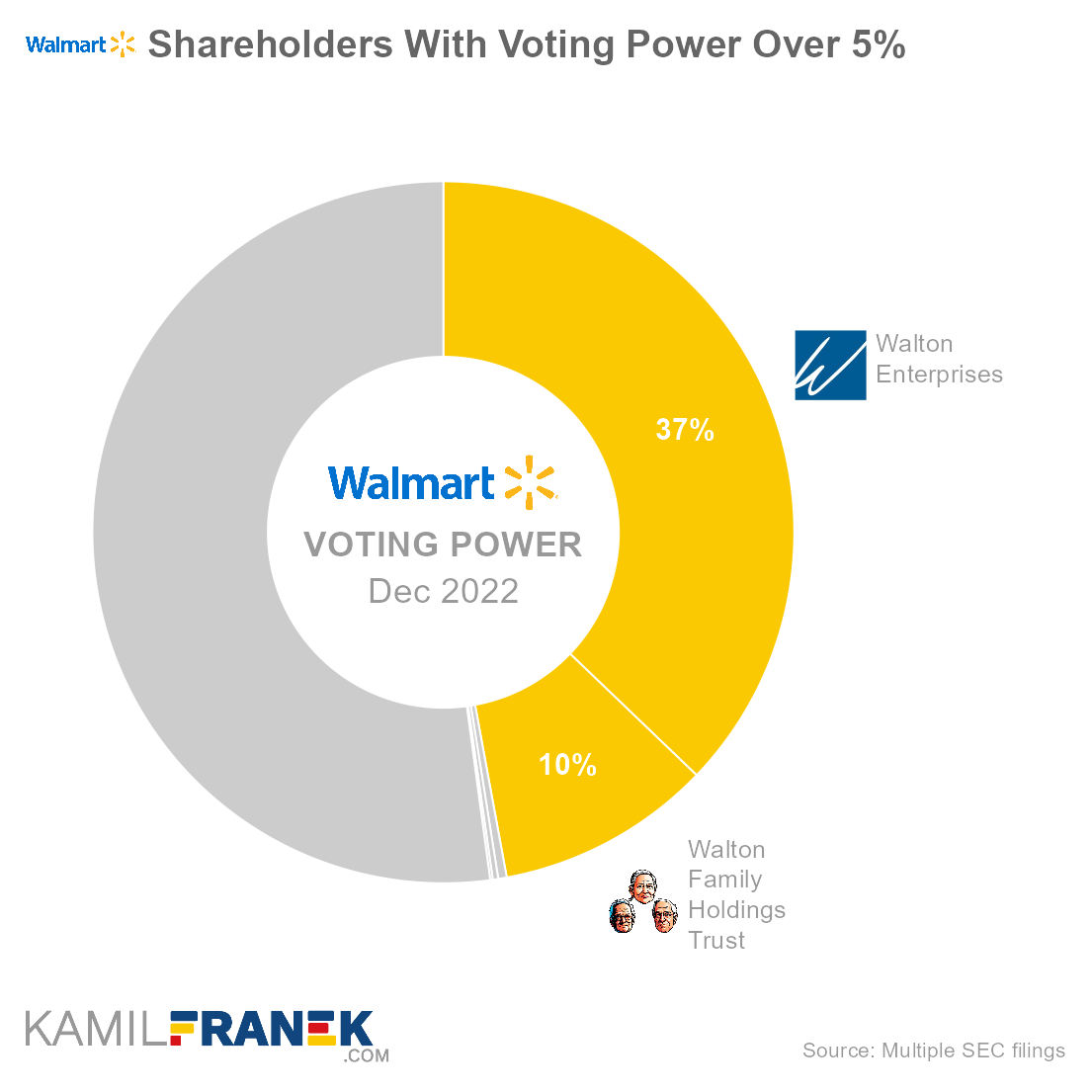
Walmart is controlled by the Walton family, descendants of the company founder Sam Walton. The Walton family controls directly and indirectly 47.9% of the voting power. It is not a majority, but since not all votes are present at shareholders’ meetings, it is enough for the Waltons to be in charge.
Walmart has only one class of outstanding shares, with one vote per share. Therefore, there is no difference between the shareholder’s ownership and voting power.
In their control over Walmart, Walton’s family has to really act together as a family. Their control is executed mainly through their family holding company Walton Enterprisess LLC. To exercise their voting power in Walmart, they have to agree internally on what proposals and decisions they want to support. No individual alone can force his way out.
- Original voting power in Walton Enterprises LLC that founder Sam Walton set up later in his life was 20% for each of his four children, 10% for Sam, and 10% for his wife.
- When his son John Walton died in a plane crash in 2005, some of his stakes went to his son and wife. A big part was also donated.
Walmart’s insiders that have influence over the company are CEO Doug McMillon, chairman of the board Gregory Penner, and other board members and executives.
- Walmart’s board of directors consists of 11 members who are reelected annually.
- The Walton family, who controls the company, has several family members on the board.
- Rob Walton, the son of the Walmart founder, used to be chairman of the board until his son-in-law Gregory Penner took over. Rob is still a director.
- Steuart Walton, another family member, “inherited” his position from his father, Jim Walton, who resigned in 2015
- CEO Doug McMillon is also a board member.
- Marissa Mayer, famous mainly for her 5-year stint as CEO of Yahoo, also holds a seat on Walmart’s board.
- A past board member is also Hillary Clinton. She was part of Walmart’s board from 1986 to 1992.
- Nobody from the board of directors outside Walton family members holds more than 0.05% of Walmart’s shares.
Some people might get the idea that Walmart is a friendly family business, but that would be wrong. It is still a retail business, which is one of the toughest to succeed in. Drive for this success means that Walmart and, indirectly, Walton’s family, as a controlling shareholder, were involved in many things that were either outright illegal or at least controversial.
- Walmart has faced a cascade of lawsuits and issues with regard to its workforce. These issues involve low wages, poor working conditions, and inadequate health care.
- The company was involved in several bribery scandals in Mexico.
- Walmart historically purchased life insurance for its employees, including “low-level” employees such as janitors, cashiers, and stockers.
- Walmart was accused several times of selling items at too low a cost for the purpose of injuring and destroying competition. They won some of them and settled others.
- Walmart refused to stock emergency contraception pills in its pharmacies.
- They used undocumented workers.
- The US Department of Justice sued Walmart for contributing to the opioid epidemic in the United States by filling illegal prescriptions of controlled substances and failing to report suspicious orders to the Drug Enforcement Agency.
Walmart is also known for its strong anti-union stance. For example, in 2000, meat cutters in Jacksonville, Texas, voted to unionize. Walmart subsequently eliminated in-house meat-cutting jobs in favor of prepackaged meats, claiming that the measure would cut costs and prevent lawsuits.
- Another example is when Walmart closed one store in Quebec, Canada, five months after workers successfully unionized because the union’s “business plan” did not meet Walmart’s approval.
🗳️ Breakdown of Walmart’s Outstanding Shares and Votes by Top Shareholders
Walmart Inc. had a total of 2,693 million outstanding shares as of December 2022. The following table shows how many shares each Walmart’s large shareholder holds.
|
|
||||
| In millions of shares as of December 2022 | ||||
| Shareholder | Class A | Total | % Share | |
|---|---|---|---|---|
| Walton Enterprises | 1,001 | 1,001 | 37.2% | |
| Walton Family Holdings Trust | 268 | 268 | 9.9% | |
| Jim Walton | 11 | 11 | 0.4% | |
| Alice Walton | 7 | 7 | 0.3% | |
| Rob Walton | 3 | 3 | 0.1% | |
| Other | 1,404 | 1,404 | 52.1% | |
| Total (# millions) | 2,693 | 2,693 | 100.0% | |
| Listed are shareholders holding >5% of any share class or notable in other ways | ||||
 Source: Multiple SEC filings Source: Multiple SEC filings |
||||
There were 2,693 million votes distributed among shareholders of Walmart Inc.. The table below shows the total number of votes for each large shareholder.
|
|
||||
| In millions of votes as of December 2022 | ||||
| Shareholder | Class A | Total | % Share | |
|---|---|---|---|---|
| Walton Enterprises | 1,001 | 1,001 | 37.2% | |
| Walton Family Holdings Trust | 268 | 268 | 9.9% | |
| Jim Walton | 11 | 11 | 0.4% | |
| Alice Walton | 7 | 7 | 0.3% | |
| Rob Walton | 3 | 3 | 0.1% | |
| Other | 1,404 | 1,404 | 52.1% | |
| Total (# millions) | 2,693 | 2,693 | 100.0% | |
| Listed are shareholders holding >5% of any share class or notable in other ways | ||||
 Source: Multiple SEC filings Source: Multiple SEC filings |
||||
💵 Breakdown of Walmart’s Market Value by Shareholder
The following table summarizes how much is each shareholder’s stake in Walmart Inc. worth.
However, keep in mind that a stake in Walmart could be just one part of their portfolio, and their total worth could be bigger, thanks to other investments. It could also be lower if they have debts.
|
|
||||
| Market value in billions $ as of December 2022 | ||||
| Shareholder | Class A | Total | % Share | |
|---|---|---|---|---|
| Walton Enterprises | $143.7 | $143.7 | 37.2% | |
| Walton Family Holdings Trust | $38.4 | $38.4 | 9.9% | |
| Jim Walton | $1.5 | $1.5 | 0.4% | |
| Alice Walton | $1.0 | $1.0 | 0.3% | |
| Rob Walton | $0.5 | $0.5 | 0.1% | |
| Other | $201.6 | $201.6 | 52.1% | |
| Total ($ billions) | $386.7 | $386.7 | 100.0% | |
| Listed are shareholders holding >5% of any share class or notable in other ways | ||||
 Source: Multiple SEC filings Source: Multiple SEC filings |
||||
Let’s now look at each Walmart shareholder individually.
📒 Who Are Walmart’s Largest Shareholders?
Let’s now go through the list of the largest shareholders of Walmart Inc. one by one and look at who they are, how many shares they own, what is their voting power, and how much is their stake in Walmart worth.
#1 Walton Enterprises (37.2%)
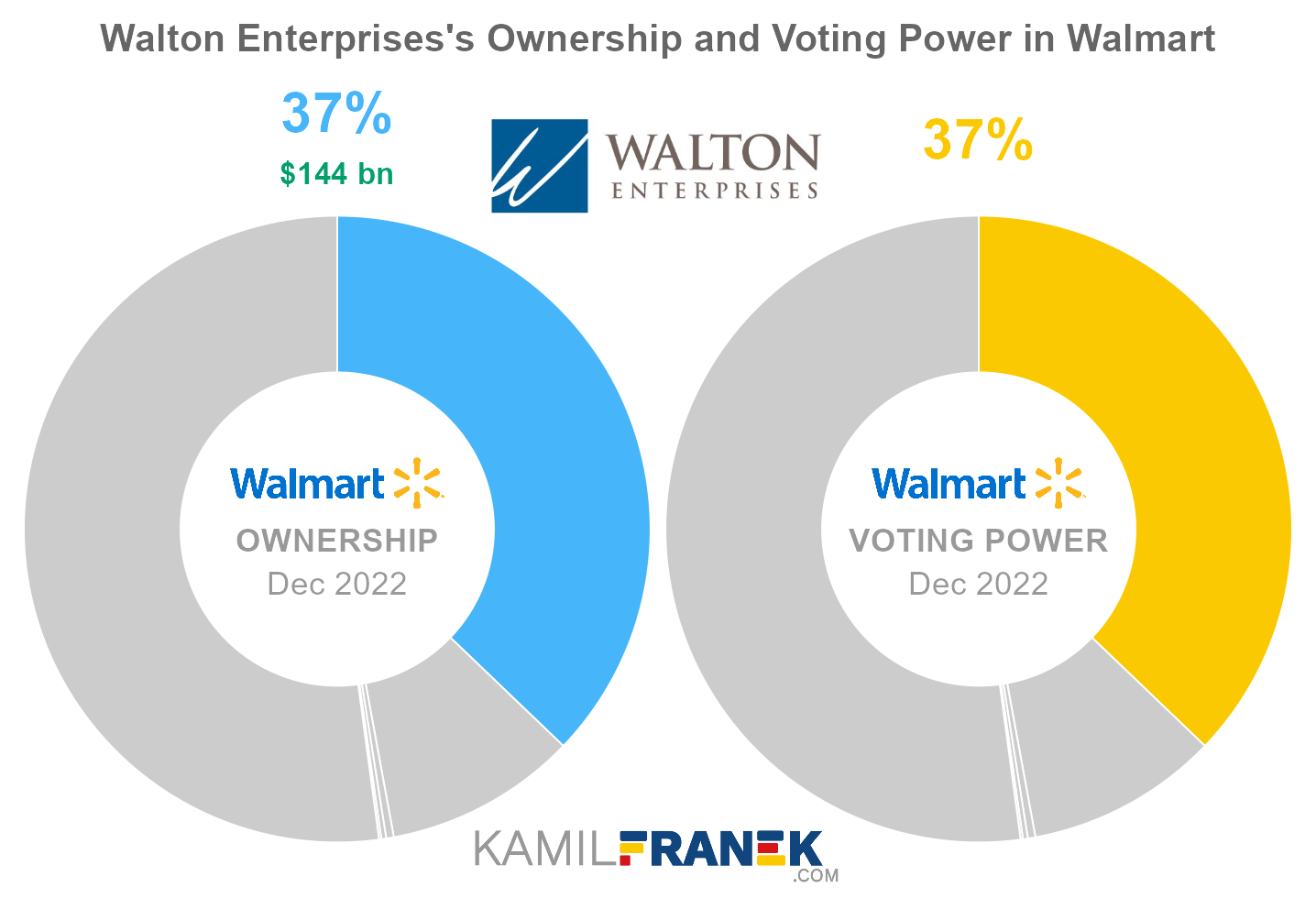
Walton Enterprises is the largest shareholder of Walmart, owning 37.2% of its shares. As of December 2022, the market value of Walton Enterprises’ stake in Walmart was $143.7 billion.
Walton Enterprises owned 1,001 million shares in Walmart and controlled 1,001 million shareholder votes as of December 2022.
Walton Enterprises is a family-owned holding company founded by the late Sam Walton, the mastermind behind Walmart’s success. The company’s primary focus is managing the investments of the Walton family, which includes a significant stake in Walmart that provides them with substantial control over the retail giant.
But Walmart isn’t the only ace up its sleeve. Walton Enterprises also owns Arves Bank and other businesses, diversifying their family portfolio.
#2 Walton Family Holdings Trust (9.9%)
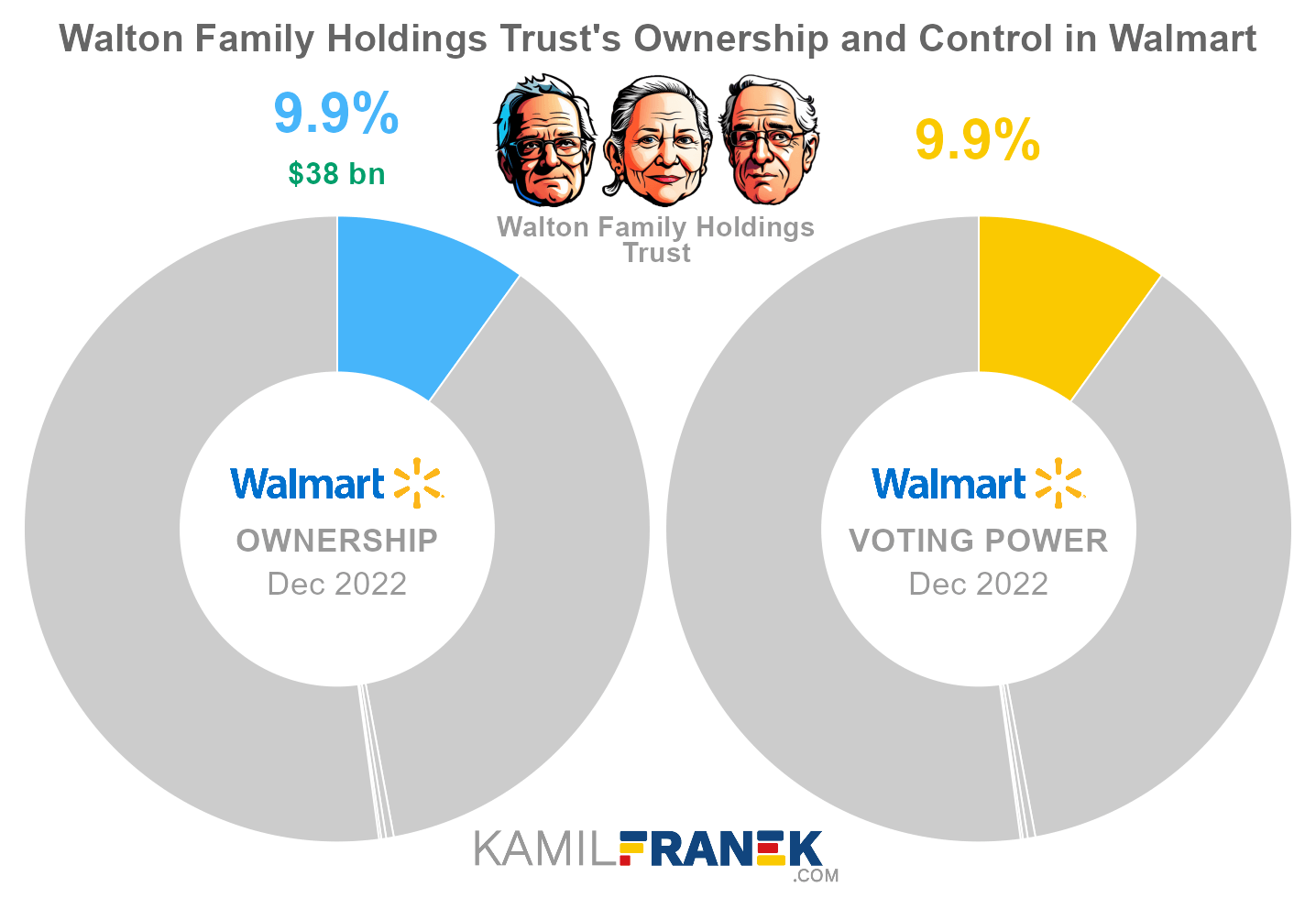
Walton Family Holdings Trust is the second-largest shareholder of Walmart, owning 9.9% of its shares. As of December 2022, the market value of Walton Family Holdings Trust’s stake in Walmart was $38.4 billion.
Walton Family Holdings Trust owned 268 million shares in Walmart and controlled 268 million shareholder votes as of December 2022.
Walton Family Holdings Trust is controlled by the heirs of Walmart founder Sam Walton. Part of the family stake in Walmart is owned through this trust.
#3 Jim Walton (0.4%)
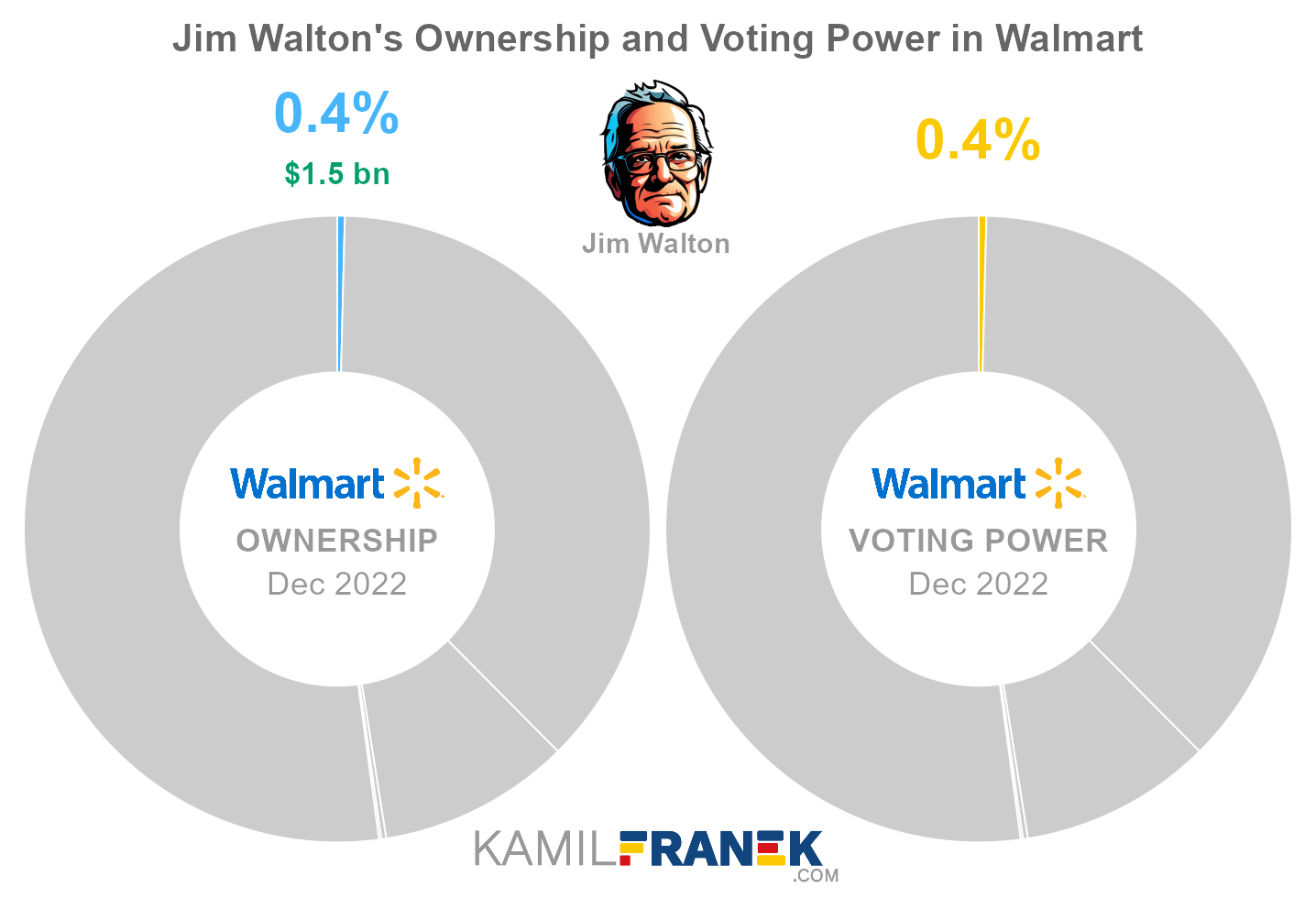
Jim Walton directly owns 0.4% of Walmart’s shares. As of December 2022, the market value of Jim Walton’s directly owned stake in Walmart was $1.5 billion. However, most of his ownership of Walmart is undirect through a family holding company and trust.
Jim Walton owned 11 million shares in Walmart and controlled 11 million shareholder votes as of December 2022.
Jim Walton is the son of Sam Walton, the founder of the world-renowned retail giant Walmart.
He is a chairman of the “family” bank, Arvest Bank, and has served on the board of Walmart from 2005 to 2016. After that, he handed over his seat to his son Steuart.
#4 Alice Walton (0.3%)
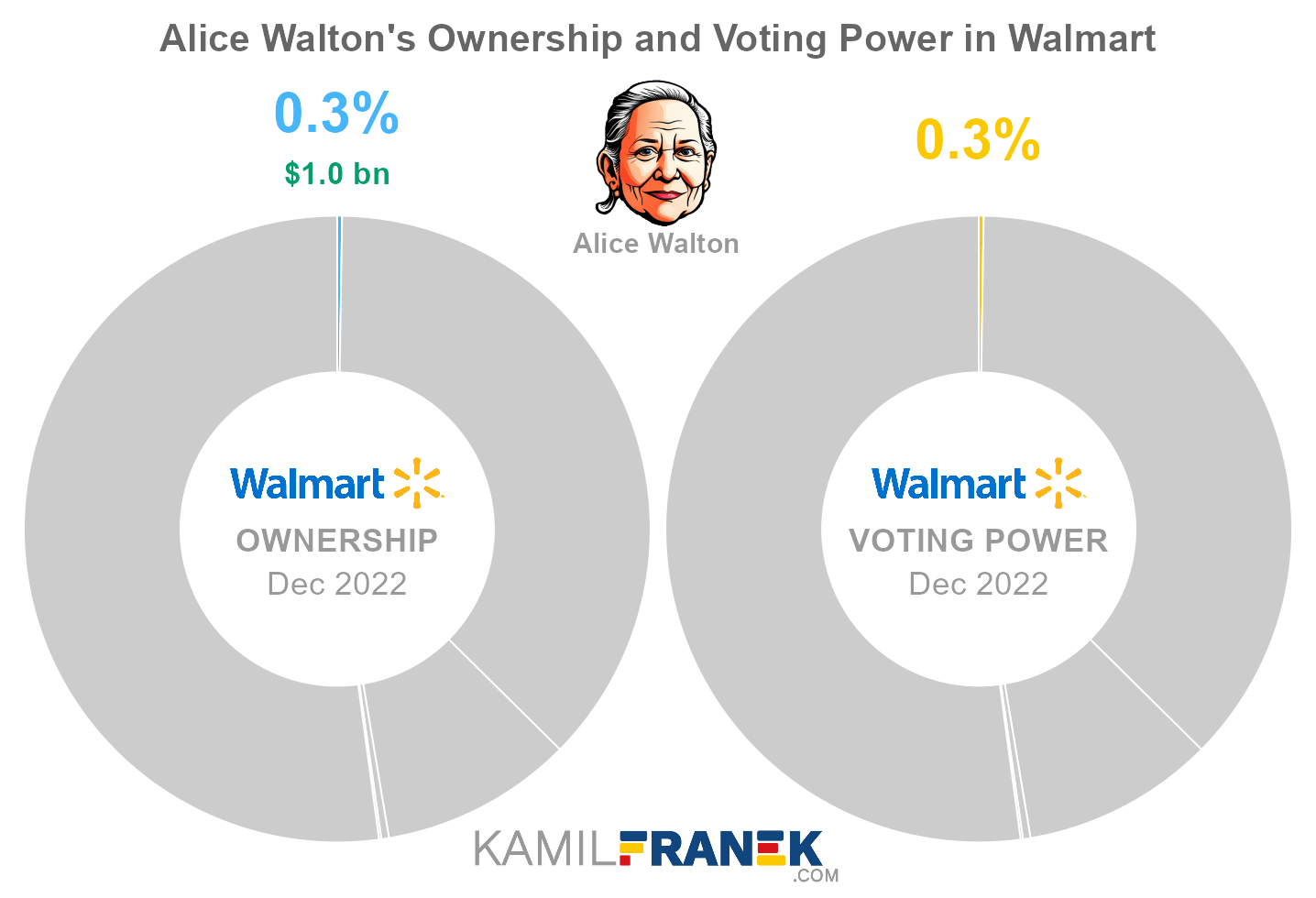
Alice Walton directly owns 0.3% of Walmart’s shares. As of December 2022, the market value of Alice Walton’s directly owned stake in Walmart was $1.0 billion. However, most of her ownership of Walmart is undirect through a family holding company and trust.
Alice Walton owned 7 million shares in Walmart and controlled 7 million shareholder votes as of December 2022.
Alice Walton is the daughter of Walmart founder Sam Walton. He is the only one of Sam’s children not actively involved in Walmart.
She tried to enter the investment banking business when she led the family-owned investment bank Llama Company, founded in 1988. She served there as chairman and CEO, but the venture was not a success and had to close in 1998.
These days, however, Alice is best known for her work as an art collector and philanthropist.
#5 Rob Walton (0.1%)
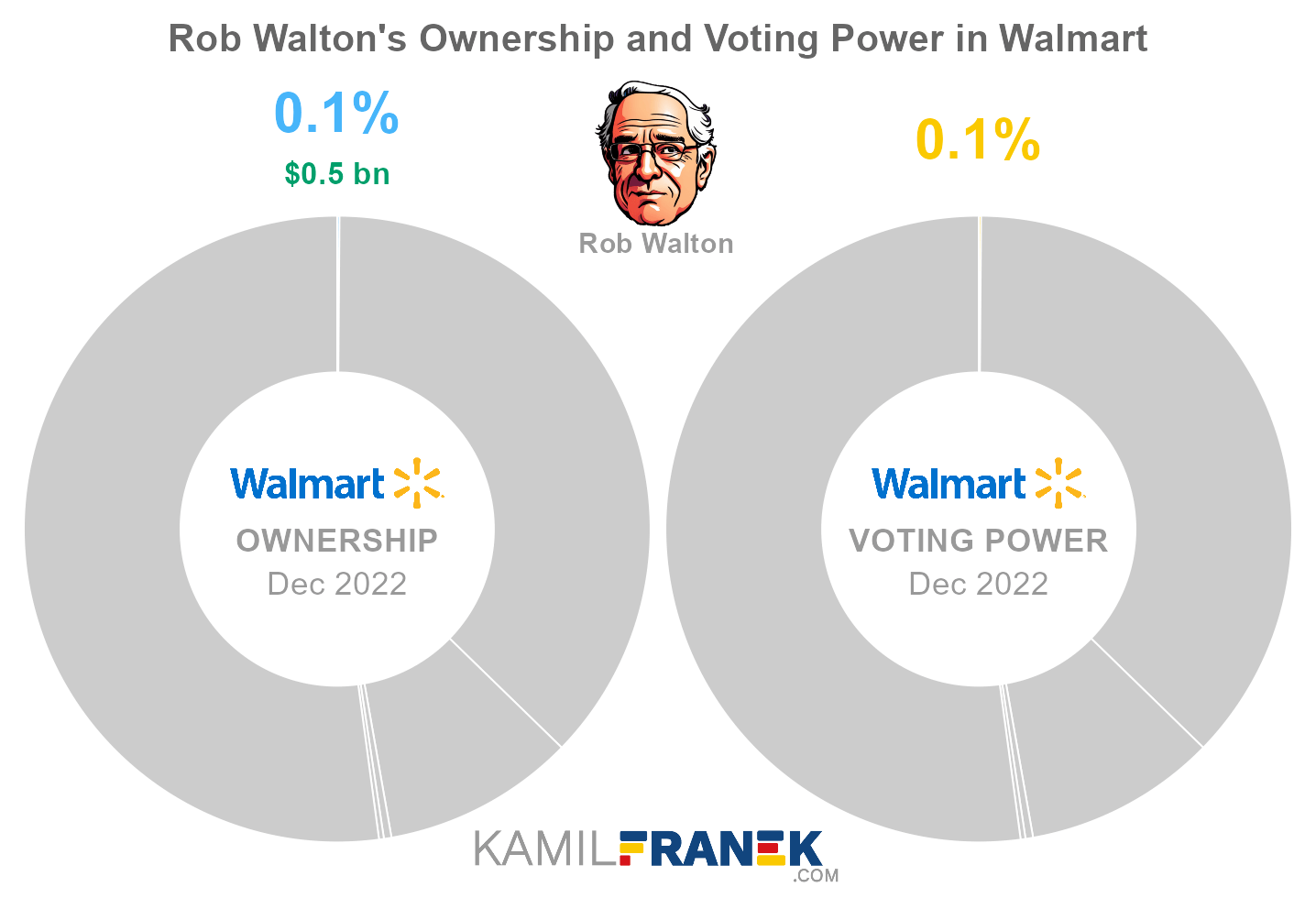
Rob Walton directly owns 0.1% of Walmart’s shares. As of December 2022, the market value of Rob Walton’s directly owned stake in Walmart was $0.5 billion. However, most of his ownership of Walmart is undirect through a family holding company and trust.
Rob Walton owned 3 million shares in Walmart and controlled 3 million shareholder votes as of December 2022.
Rob Walton is the son of Walmart founder Sam Walton. After his father passed away in 1992, Rob became the board chairman and held this position for over two decades until 2015, when he passed the baton to his son-in-law.
Despite stepping down as chairman, Walton continues to be active on Walmart’s board of directors.
Rob Walton is a well-known car collector with an impressive collection of vintage automobiles.
In 2022, he made headlines for his investment in the Denver Broncos team together with other investors.
🧱 Who and When Founded Walmart?
Walmart was founded by Sam Walton in 1962 in Rogers, Arkansas. Before that, Walton had already operated several retail stores in different locations. After co-founding Walmart with his brother Bud, the company grew rapidly, becoming the largest retailer in the United States by 1990.
In the small town of Rogers, Arkansas, something big was about to happen in 1962. Sam Walton, a man who would later become a legend in retail business, was about to open the first Walmart store. However, his journey started long before that.
After completing his college education, Sam joined J.C. Penney as a management trainee. He worked there for over a year and later joined the military. When he returned home, he took over the management of his first store with the help of a loan from his father-in-law. He operated it successfully under the Buttler Brothers franchise, learning the ins and outs of retail.
He was always looking for ways to offer customers the lowest prices possible, which led him to focus on cutting costs and streamlining operations.
When his lease was not prolonged, he opened a different store in Bentonville, Arkansas, and opened under “Walton’s 5-10” name. Sam did not stop there and soon opened more stores in other locations with his brother Bud as a business partner.
In 1962, history was made, and he opened the first Wal-Mart store in Rogers, Arkansas. The store was a success, and by 1967, the Walton family owned 24 stores, bringing $12.7 million in sales.
The company officially incorporated as Wal-Mart Stores, Inc. in 1969 and became a publicly traded company (over the counter) in 1970. That same year, the first distribution center and home office opened in Bentonville, Arkansas.
In 1972, Walmart was listed on the New York Stock Exchange with the ticker WMT. The company continued to grow, introducing Wal-Mart Supercenters in 1988 and becoming the largest retailer in the United States by 1990.
Walmart has faced many criticisms over the years for its labor practices and impact on local communities and was even involved in several corporate scandals.
Today, Walmart is the largest retailer worldwide, although its profit-making engine is still mainly in the US, and the company has scaled down its international operations.
📅 Walmart’s History Timeline
These are selected events from Walmart’s history:
- 1918: Samuel Moore Walton was born to Thomas Gibson Walton and Nancy Lee.
- 1945: Sam Walton took over the management of his first store and operated it for 5 years.
- 1950: Sam Walton purchases a store in Bentonville, Arkansas, and opens “Walton’s 5-10.”
- 1962: Sam Walton, with his brother Bud as a partner, co-founded Walmart and opened its first Walmart store in Rogers, Arkansas.
- 1967: The Walton family owns 24 stores, ringing up $12.7 million in sales.
- 1969: The company officially incorporates as Wal-Mart Stores, Inc.
- 1970: Walmart becomes a publicly traded company (over the counter). The first stock is sold at $16.50 per share.
- 1971: The first distribution center and Home Office opened in Bentonville, Arkansas.
- 1972: Walmart is listed on the New York Stock Exchange with ticker WMT.
- 1972: Jim Walton joined Walmart and was involved in its real-estate dealings.
- 1977: Walmart expands into Illinois and makes its first corporate acquisition of Mohr-Value stores.
- 1978: Rob Walton joined Walmart as a senior vice president.
- 1978: First pharmacy opens.
- 1979: The Walmart Foundation is established.
- 1980: Walmart reaches $1 billion in annual sales
- 1982: Rob Walton was appointed vice chairman of Walmart.
- 1983: The first Sam’s Club opens in Midwest City, Oklahoma.
- 1983: Walmart replaces cash registers with computerized point-of-sale systems, enabling fast and accurate checkout.
- 1987: The company installs the largest private satellite communication system in the U.S., linking the company’s operations through voice, data, and video communication.
- 1988: Wal-Mart introduced Wal-Mart Supercenters.
- 1990: Wal-Mart became the largest retailer in the United States.
- 1991: Through a joint venture with Cifra, a Mexican retail company, Walmart goes global, opening a Sam’s Club in Mexico City.
- 1991: Walmart began offering private label brands with the launch of Sam’s Choice, a line of drinks produced by Cott Beverages for Walmart.
- 1991: Walmart stopped selling music albums marked with the RIAA’s Parental Advisory Label
- 1992 US President George H. W. Bush presents Sam Walton with the Presidential Medal of Freedom.
- 1992: Founder Sam Walton died at 74. His son Rob Walton became chairman of the board.
- 1994: Walmart expands into Canada with the purchase of 122 Woolco stores.
- 1994: Walmart acquires 91 PACE Membership Warehouse clubs from Kmart and enters the Chinese market by joint venture agreement.
- 1995: Bud Walton, brother of Sam Walton, died at the age of 73.
- 1995: Walmart expanded into Argentina and Brazil.
- 1996: Walmart opens its first stores in China.
- 1997: The company celebrates its first $100 billion sales year.
- 1999: Walmart bought ASDA in the United Kingdom for US$10 billion.
- 2000: H. Lee Scott, Jr. succeeds David Glass as CEO.
- 2000: Walmart.com is founded, allowing U.S. customers to shop online.
- 2000: Walmart paid $50 million to settle a class-action suit that asserted that 69,000 current and former Walmart employees in Colorado had been forced to work off-the-clock.
- 2000: After meat cutters in Jacksonville, Texas, voted to unionize, Walmart eliminated in-house meat-cutting jobs in favor of prepackaged meats.
- 2003: Mexico’s antitrust agency investigated Walmart for “monopolistic practices”, finding no wrongdoing.
- 2003: Germany’s High Court ruled that Walmart’s low-cost pricing strategy “undermined competition.”
- 2003: Federal agents raided 61 Walmart stores in a crackdown known as “Operation Rollback,” resulting in the arrests of 250 nightshift janitors who were undocumented.
- 2004: Walmart tested its own dollar store concept.
- 2004: Walmart closed a store in Jonquière, Quebec, Canada, after the successful unionization of the employees
- 2005: John Walton died, and his brother John replaced him on the Wal-Mart Board of Directors.
- 2005: Walmart executive Tom Coughlin was forced to resign from its board of directors, facing charges of embezzlement.
- 2006: Walmart announced the sale of its 16 stores in South Korea to Shinsegae Co, which rebranded the stores to E-Mart.
- 2006: Walmart was excluded from the investment portfolio of The Government Pension Fund of Norway due to alleged labor rights violations in Walmart operations.
- 2006: Walmart announced a complete pull-out from the German market; all existing 85 stores were sold to the Metro Group, which rebranded most of them to Real (hypermarket).
- 2006-08: Walmart announced that workers at all Chinese stores could join trade unions; the company would work with the state-sanctioned All-China Federation of Trade Unions on representation for its staff.
- 2007: Walmart.com launches its Site to Store service, enabling customers to make a purchase online and pick up merchandise in stores.
- 2009: Walmart entered Chile by acquiring Distribucion y Servicio D&S SA.
- 2009: Walmart entered into a 50/50 partnership with Bharti to gain access to the Indian market.
- 2009: Mike Duke becomes CEO.
- 2009: Walmart.com opened to third-party sellers.
- 2010: Bharti Walmart, a joint venture, opens its first store in India.
- 2010: Walmart Canada Bank was introduced with the launch of the Walmart (Canada) Rewards MasterCard.
- 2010: Walmart confirmed it was acquiring the video streaming company Vudu, Inc. for an estimated $100 million
- 2011: Walmart expands its business into South Africa by acquiring 51% of Massmart Holdings Limited.
- 2012: The New York Times reported that Walmart executives in Walmart México had paid millions of dollars in bribes to local officials to expedite permits for the construction and operation of its stores in Mexico. Executives at Walmart México allowed the investigation to be concluded by a short report from the head of Walmart México, who had himself been suspected of involvement.
- 2012: Bharti and Walmart separated to pursue business independently.
- 2014: Doug McMillon succeeds Mike Duke as CEO. Greg Foran becomes President and CEO of Walmart U.S.
- 2014: Walmart employees went on strike in several major cities in the United States.
- 2016: Walmart Express, a chain of smaller discount stores, closed all 102 stores as part of a plan to close 269 stores globally.
- 2015: Rob Walton handed over the position of the Chairman to his son-in-law Greg Penner
- 2015: Walmart began testing a free grocery pickup service
- 2015: Walmart took full ownership of Chinese online supermarket Yihaodian.
- 2015: Walmart stopped selling military-style semi-automatic rifles like the AR-15.
- 2016: Walmart agrees to acquired e-commerce website Jet.com for US$3.3 billion.
- 2016: The US Department of Justice sued Walmart for contributing to the opioid epidemic in the United States by filling illegal prescriptions of controlled substances and failing to report suspicious orders to the Drug Enforcement Agency.
- 2016: Walmart acquired Parcel, a delivery service in New York.
- 2017: Walmart offers in-store pickup for online orders at 1,000 stores with plans to eventually expand the service to all of its stores in the US.
- 2017: Walmart announced the acquisition of Moosejaw, a leading online active outdoor retailer, for approximately $51 million.
- 2017: Walmart agreed to acquire the men’s apparel company Bonobos for $310 million in an effort to expand its fashion holdings.
- 2018: Wal-Mart changed its name to Walmart Inc. from Wal-Mart Stores, Inc.
- 2018: Walmart started crowdsourcing delivery services to customers using drivers’ private vehicles under the brand “Spark.”
- 2018: Walmart stopped selling firearms and ammunition to 18-20 years old, which led to a lawsuit.
- 2018: Walmart was sued by former Director of Business Development Tri Huynh for claims of reporting misleading e-commerce performance results in favor of the company.
- 2018: Walmart acquired a 77% controlling stake in the Indian e-commerce website Flipkart for $16 billion. It was later renamed to Duo Bank of Canada.
- 2018: Wal-Mart Canada announced it had reached an agreement to sell Wal-Mart Canada Bank to First National co-founder Stephen Smith and private equity firm Centerbridge Partners, L.P.
- 2018: Walmart’s Winemakers Selection private label wine was introduced in about 1,100 stores
- 2019: Walmart launches InHome Delivery and free NextDay delivery from Walmart.com.
- 2019: Walmart insources its advertising business, now known as Walmart Connect.
- 2019: Walmart opened its first Health Center, a “medical mall” where customers can purchase primary care services, such as vision tests, dental exams and root canals, lab work, X-rays and EKGs, counseling, and fitness and diet classes.
- 2020: Walmart launches Walmart+ membership program to help customers save even more time and money.
- 2020: Walmart Argentina is acquired by Grupo de Narváez.
- 2020: Walmart discontinues Jet.com website.
- 2020: Walmart announced they would be selling 65% of their shares in Seiyu to the private-equity firm KKR in a deal valuing 329 stores and 34,600 employees at $1.6 billion.
- 2021: Walmart completes the sale of United Kingdom grocery chain Asda.
- 2021: A federal jury found that Walmart, along with Walgreens and CVS, “had substantially contributed to” the opioid crisis. The damages between the three chains in this suit totaled $650 million.
- 2022: A drone delivers a package from a Walmart Supercenter.
- 2022: Walmart+ members receive free delivery on general merchandise and fresh groceries.
- 2022: Walmart announced that it would sell its Amigo stores in Puerto Rico to Pueblo Inc.
- 2022: Walmart announced it was partnering with Paramount to offer Paramount+ content to its Walmart+ subscribers in a bid to better compete with Amazon.
📚 Recommended Articles & Other Resources
Who Owns Amazon: The Largest Shareholders Overview
Overview of who owns Amazon.com, Inc. and who controls it. With a list of the largest shareholders and how much is each of their stake worth.
Who Owns L’Oréal: The Largest Shareholders Overview
Overview of who owns L’Oréal and who controls it. With a list of the largest shareholders and how much is each of their stake worth.
Who Owns Apple: The Largest Shareholders Overview
Visual overview of who owns Apple and who controls it. With a list of the largest shareholders and how much is each of their stake worth.
Who Owns Paypal: The Largest Shareholders Overview
Overview of who owns PayPal and who controls it. With a list of the largest shareholders and how much is each of their stake worth.
Who Owns Nestlé: The Largest Shareholders Overview
Overview of who owns Nestlé and who controls it. With a list of the largest shareholders and how much is each of their stake worth.
Who Owns Ferrari: The Largest Shareholders Overview
Overview of who owns Ferrari and who controls it. With a list of the largest shareholders and how much is each of their stake worth
Other Resources
- Walmart’s Annual Financials Statements (K-10)
- Walmart’s Proxy Statement
- Walmart’s Certificate of Incorporation
Disclaimer: Although I use third-party trademarks and logos in this article and its visuals, kamilfranek.com is an independent site, and there is no relationship, sponsorship, or endorsement between this site and the owners of those trademarks.

